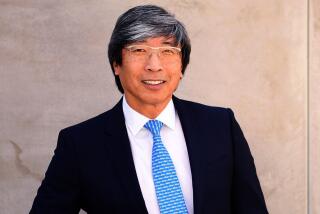For patients, a second opinion can be a safeguard
- Share via
When a surgeon recommended that 78-year-old June Atterbury undergo a complicated operation for pancreatic cancer, her children were torn.
Their mother’s internist had suggested that the disease was inoperable, that Atterbury probably would live only three to six more months. This doctor held out hope.
“He believed he could give my mother another five years of life,” recalls daughter Lucinda Jenney, an actress living in Los Angeles. But the risks the doctor described were terrifying. Catastrophic complications might develop after surgery; the procedure itself could prove fatal.
Atterbury decided to get another opinion.
The second doctor ordered additional tests and returned to the family with a surprising conclusion -- that the cancer had already progressed too far for surgery to be of benefit.
Second opinions have become more popular as insurance companies have begun encouraging them to contain health-care costs. Whether they reduce expenses is unclear, but one thing is sure: Second opinions benefit patients.
As in Atterbury’s case, getting another doctor’s recommendations can protect people against unnecessary or inappropriate treatment. It also provides information, helping patients make difficult decisions. Sometimes, second opinions simply help patients feel that they’re making the right choice.
Despite all that second opinions have to offer, some patients don’t want to delay their treatment while waiting for the consultation; others don’t want to (or can’t) pay for the extra visit.
But brief delays in treatment generally make little difference, even for conditions such as cancer and heart disease.
“In my experience, getting a second opinion never causes a significant delay,” says Martin Gelbard a urologist and clinical professor at UCLA. “You don’t want to waste weeks and weeks doing it but, if it’s important, there’s certainly time.” For people with medical insurance, cost may not be such a large issue; second opinions frequently are covered. (Some companies actually insist on them before surgery.) Even Medicare pays for second opinion, and will help cover the cost of a third opinion if the first two doctors don’t agree.
Furthermore, the second opinion is typically less costly than the first one because the tests needed to make a diagnosis or recommend treatment have usually been completed. The second physician typically orders additional tests only if they can provide new information.
Some patients are reluctant to ask for second opinions for fear of offending their regular physician. However, most doctors aren’t troubled by such a request -- some actually welcome them. “I often tell people that a second opinion is never a bad idea,” Gelbard says. “I think getting one helps people feel more comfortable with their decision.”
A second opinion won’t always make your decision about a particular treatment or procedure easier, especially if the two doctors disagree about the best course. As Jenney noted, “Aside from the disease itself, the second-opinion dilemma was the most difficult part of the journey.”
When two doctors disagree about treatment, it’s usually best to get a third opinion. That’s what Atterbury did, and she ultimately decided against having the operation.
Three months and two days after receiving the initial diagnosis, she died. Nevertheless, her children are confident that the right decision was made.
“It became clear that surgery would really not have helped her,” Jenney says. “Because her death was so peaceful, I’m grateful she wasn’t subjected to it unnecessarily.”
*
(BEGIN TEXT OF INFOBOX)
When to seek other advice
A patient should consider getting a second opinion when:
* The doctor recommends surgery, long-term treatment, risky therapy or controversial measures.
* The diagnosis is for a life-threatening condition.
* The doctor doesn’t know what is wrong.
* The current treatment isn’t working.
Get a second opinion from a physician who has specialized training and extensive experience in treating the particular kind of medical problem you have. If you don’t know how to find one, consider asking your doctor to help you choose a suitable consultant.
If you want an independent opinion, a physician referral service at a major medical center might be helpful.
Second opinions via the Internet are offered for conditions from thyroid disease to mental health disorders at many major medical centers, including the Cleveland Clinic, Johns Hopkins Hospital and Columbia University Medical Center.
*
Dr. Valerie Ulene is a board-certified specialist in preventive medicine practicing in Los Angeles. She can be reached at themd@att.net. The MD appears the first Monday of the month.
More to Read
Inside the business of entertainment
The Wide Shot brings you news, analysis and insights on everything from streaming wars to production — and what it all means for the future.
You may occasionally receive promotional content from the Los Angeles Times.










